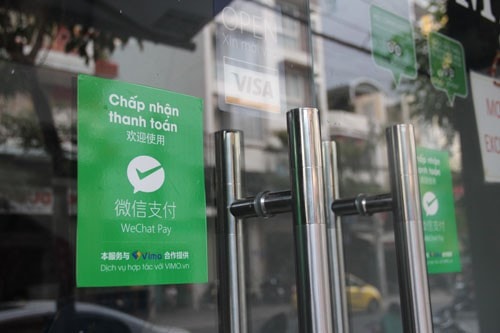Big risks when Vietnamese stores pay with Chinese e-wallets
According to the State Bank, some stores that allow Chinese customers to make "illegal" payments can evade taxes and fees, but there are also risks because payments must be made through accounts opened in China.
A representative of the State Bank (SBV) said that recently in big cities, there has been a situation where some stores only serve foreign tourists, mostly Chinese tourists. Accordingly, when buying goods, tourists can transfer money directly abroad through POS machines (card swiping machines) or QR Codes (quick response codes) illegally without going through any Vietnamese banks or payment intermediaries.
 |
A store in Khanh Hoa allows tourists to pay via WeChat Pay. |
Normally, after purchasing goods and services at tourist destinations in Vietnam, Chinese tourists will swipe their cards on POS machines that are directly connected to foreign payment banks or use mobile e-wallets such as Alipay and Wechat Pay (from China) to pay by QR Code. The money will be transferred from the tourist's account to the seller's account, all opened at foreign banks, without going through the Vietnamese banking system.
There are many problems that arise but the biggest problem is that the government does not collect taxes from these commodity transactions.
According to the leader of the State Bank, the nature of this form of payment is that Vietnamese stores use foreign payment systems to receive shopping money from Chinese customers. Stores can avoid taxes and fees, but there are also risks because the stores are Vietnamese but must pay through ID - accounts opened in China. Without assistance and support, it may be impossible to receive money transferred from China to stores in Vietnam.
"According to this payment process, Vietnam will face many difficulties in managing the illegal use of POS devices, especially payments through unauthorized applications installed on mobile devices," commented a representative of the State Bank.
In the case of Chinese customers using e-wallets such as Allipay, Wechat Pay... to pay by QR Code at payment acceptance units in Vietnam, the process is similar to swiping cards via illegal POS. The difference is that payment information will be transferred from the seller to Chinese payment organizations (owners of Alipay and Wechat Pay applications) and then to banks in China and vice versa.
The State Bank of Vietnam said it is actively and proactively coordinating with ministries, branches, and units to research and propose measures to handle the problem within the scope of functions and tasks of each branch. At the same time, it directed the State Bank branches in provinces and cities to report to the People's Committees of provinces and cities to direct relevant functional units in the area such as tourism, police, market management, tax... to coordinate with the State Bank branches in provinces and cities to conduct inspections and checks on the operations of this store system to thoroughly handle it.
"These are issues related to the roles and functions of many ministries and agencies. In particular, it is necessary to have direct management, inspection and supervision by local authorities to thoroughly handle them, ensuring that the business activities of these stores comply with the law and avoid the risk of tax losses for the state" - the representative of the State Bank commented.
Previously, the Government Office also sent a document to a series of relevant agencies regarding information reflecting illegal money transfers via POS. Deputy Prime Minister Vuong Dinh Hue assigned the Ministry of Culture, Sports and Tourism, the Ministry of Public Security, the Ministry of Industry and Trade, the Ministry of Finance, the State Bank of Vietnam, etc. to direct and organize inter-sectoral inspection and examination forces to review, detect and strictly and promptly handle points of sale of goods and services that violate the law, illegally use foreign payment methods, and violate Vietnam's regulations on payment, foreign exchange, and trading of goods and services.

